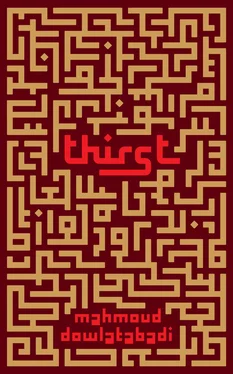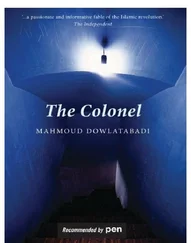‘Jamoo … jamoo … jamoo …’
‘Put your hand down! Put your hand down, boy! Okay, then, I promise I’ll personally untie your hand just as soon as I can. I’ll free his hand from yours. But let’s wait until it’s light so I can see what I’m doing! Wait … I might send him to the trenches behind us. But right now I can’t do anything, understand? Nothing! Just put your hand down! The boy’s gone mad from thirst! What should I do with him? Patience, be patient boy! Itikaf . bThink you are in the meditative trance of itikaf . But stay alert! Give me your weapon. Quick! That’s an order, give it here! I’m giving you an order. Quick! Point the muzzle down towards the ground. Very well, I’ll keep it for you. I’ll keep an eye on your captive too. Though there’s no life left in him either. Why don’t you go and lie down for a bit? Get some rest! Have a quick catnap! You do understand this order, don’t you? Take a nap while you’re still on your feet then! As in with your eyes open! When it’s time, I’ll call you to attention with a punch! And don’t repeat that word “jamoo” again, or I’ll go crazy, which would be to no one’s advantage. It will be bad! Very bad! Understood? So now lay your head on this clod of earth and lie down. You too, anta ! Like two brothers. Until I figure out when this false dawn is going to break. My arms and legs are stiff … I must exercise them a bit … but … but … the sound … sound … what’s that sound? I have to think, I must think, think. Someone once told me that you can get yourself out of a dead end by thinking. I mustn’t succumb. I’ll think … about … a woman …’
A woman, a young lady whose face gradually emerges from particles of light. A picture in a rectangular frame with a sky-blue background. She wears a black chador. She’s young, her face tawny-white and beautiful. She has been mourning … she’s still dressed in widow’s weeds. There is no tremor in her voice, but she sounds unhappy all the same. She has no name. There are many widows whose names remain unknown. She speaks plainly, plainly and precisely. Always at night, it always happens in the night. The lady says it was at night that he arrived. He had waited until it was nighttime to return. He didn’t want the neighbours to see him. He was wearing a uniform. His clothes were smeared with mud and dirt and here and there there were stains I could not identify. His clothes were stained with tar as well. His hair was unkempt. It was only from his brow, cheeks and eyes that I could identify him. When he came to the door, he just stood there. I looked at him enquiringly, why don’t you come in? At this, he looked down, drawing my attention to his boots and the bottoms of his trousers. They were caked with mud and dirt up to his knees. I took his hand and told him I’d wash them for him … I led him into the room — at this point grief forces her to stop her narrative, yet still she remains composed. She swallows her sorrow in a moment of silence to prevent her eyes from welling up with tears. A glass of water is on a tray next to her. She takes a quick gulp, revealing nothing but a hand up to the wrist from under her chador, then she is ready to continue. Now the light particles have dispersed somewhat and the copper tray and the glass of water can be seen clearly, along with the cushion resting against the wall. All eyes remain transfixed and all ears sharpened to hear the simple story that is being recounted. Truth in its purest form is always simple. Now I realized why he had waited until late at night to come. He didn’t want the neighbours to see him in this state. He said pretence is vulgar. He said there may be some people who could have gone to war but didn’t. He said that one should not embarrass them. I sat down to untie the laces of his boots, but he wouldn’t let me. He said he had the knack of untying them. I brought him his own clothes. When he took off his boots, he removed his socks too, picked them up and went to the bathroom and half-closed the door. I asked him to drop them in the laundry basket, I told him I’d wash them for him later. I heard him say, ‘Alright, so you’ll prepare something for us …’ But he never completed his sentence by saying ‘… to eat’. Instead, he emerged that instant, without having showered, wearing his old civilian clothes, which were too big for him. He put on a pair of slippers and said he would be back soon, then went straight out of the door and I heard him close the courtyard gate halfway; he didn’t close it completely. He knew he shouldn’t speak of dinner. When I asked where he was going, he said he just had to deliver a message quickly. I knew even if he had a message to deliver he would have done so before coming home. I was on the point of saying to him that we could go to my mother’s for dinner, but he was already gone. I don’t know how much time passed before I came to my senses, took a plastic tub, placed it under the shower, poured some washing powder into it and waited for him to return to empty his pockets himself. Then I put the clothes in the tub to soak and started cleaning his boots and scraping away the tar that was stuck fast to their soles. I tossed his socks into the tub. How heavy his boots were from all the mud and tar stuck to them! I had to put a plug in the floor drain so the tar wouldn’t get down the pipes and clog them. As a result, the bathroom floor became awash with black, tarry water. Once I’d scraped off as much muck as I could, I propped the boots against the bathroom wall, and that was when I caught sight of him through the narrow opening of the door, standing in the middle of the room, on the exact same spot where I’d been standing when he left. He seemed to be looking at his newly clean boots. I heard him say ‘Come on, dinner will get cold!’ There was a smell of kebabs and basil; I ran and spread a tablecloth on the floor. He said he’d been lucky to get there just in time, he had been the last customer and these were the last skewers. I didn’t ask. I knew there was no money in the pockets of his own clothes. He hadn’t touched the pockets of his uniform either, so … He looked at me and I at him and we both sat down to eat. He brought over a jug of water and glasses and I didn’t like to ask why there had been so much tar and mud stuck to the soles and ankles of his boots. And he spoke little. Very little.
There was an explosion … Suddenly there was an explosion!
Dirt and sun and soldiers, the trench and the dirt and the sun and an explosion — the confused chatter of various automatic weapons, the sound of continuous firing from anti-aircraft guns, bodies blown into the air and ripped and torn apart, human frames, annihilation, instant craters. The film seems to be running so fast that it’s impossible to estimate the time. Perhaps the entire duration of the explosion was just a few moments, maybe less than thirty seconds. And then a discourse begins on the heroism of a man, a young man whose wife thought he looked like an innocent child as he stood in the middle of the room holding bread and kebabs wrapped in newspaper. And the screen of imagination shows the face of a man who had a soft and sparse beard and tawny skin, a little too pale, and his gaze is so bland that he seems oblivious to the presence of the camera; he’s about twenty-seven or twenty-eight years old. This is the same picture as the one that’s propped up in a niche in the room, resting against the wall between two old tulip-shaped lamps. The colour slowly drains from the man’s face and is replaced by the profile of the young woman, who fell silent at some point and who now resumes:
‘I was startled by the sound of the explosion, but he remained silent. Then he murmured: “People’s houses; have they no shame?” And saying this he stepped back from the tablecloth. It was the first or second year after the bombing of Tehran had begun. I didn’t ask why he’d stepped back from the tablecloth. I assumed he’d just got used to eating very little at the front. While he prayed, I washed his clothes. During his ritual ablution before prayers he had asked me to empty his pockets. As I washed the uniform, filthy black water slopped over the side of the tub and spread over the bathroom floor. I washed them again, twice, three times. I heard him asking me to spread them out to dry, he didn’t have much time. I realized then that he was leaving again early the next morning. I didn’t ask “Why so early?” It occurred to me that he might have come here on a mission. Because in the darkness of the early morning, a car sounded its horn outside and he put on his still-damp uniform. I placed his boots next to his feet and watched him leaving from behind the window and saw the car. I saw him climb in and give me a wave.’
Читать дальше












